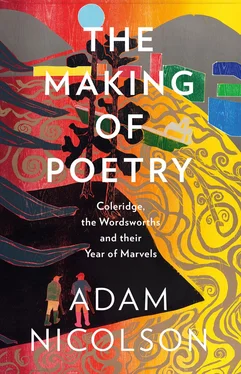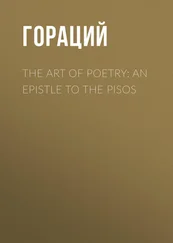In 1787 Wordsworth was sent to Cambridge, and encouraged by those relations to think of a career in the Church. But at Cambridge, while ferociously aware of his own great gifts, he had refused to engage with the route required by a conventional career, and had been ‘an idler among academic bowers’. The great emotional and intellectual experience of his time as an undergraduate was not at Cambridge itself, but on a heroic three-thousand-mile walk in the summer and autumn of 1790 through France in the first glow of its revolutionary fever, to Switzerland and the epic landscapes of the Alps. France then was ‘standing on the top of golden hours/And human nature seeming born again’.
After he had left university, with no good degree, he went to London, directionless and unfocused, unable to commit to any life in the Church, the law, university, politics or commerce. He felt ‘rotted’:
my life became
A floating island, an amphibious thing
Unsound, of spungy texture.
But the scent of liberty was coming across the Channel. A decade earlier, the Americans had cast themselves free. Now an ancient European monarchy was heading for a rational, liberated future. Richard Price, a suddenly famous dissenting minister-turned-lecturer, was drawing vast crowds to his London talks. ‘A general amendment’, he told his excited audience, was beginning in human affairs:
the dominion of kings [is] changed for the dominion of laws, and the dominion of priests giving way to the dominion of reason and conscience. Be encouraged, all ye friends of freedom, and writers in its defence!
Once again, Wordsworth was drawn to France, not only to escape the urgings of his relatives, who had in mind a rural curacy, but to taste and know the sources of the future. This time he went to the Loire valley, where, even as the massacres were committed in Paris and the French Republic was being declared, he met two people who had a shaping influence on his life and thought. The first was an officer in the army, Armand-Michel Bacharetie de Beaupuy, known simply as Michel Beaupuy, an aristocrat from the Périgord, now in his mid-thirties, and a republican idealist, who in Wordsworth’s loving remembering of him in The Prelude sounds like a vision of the perfect man. They talked politics and the virtues of change, weighing the best of ancient republican systems against the extremes of revolutionary violence, sifting what seemed good from the horrors and strains of the moment.
Injuries
Made him more gracious, and his nature then
Did breathe its sweetness out most sensibly,
As aromatic flowers on Alpine turf,
When foot hath crushed them.
By birth he ranked
With the most noble, but unto the poor
Among mankind he was in service bound,
As by some tie invisible, oaths professed
To a religious order. Man he loved
As man, and, to the mean and the obscure,
And all the homely in their homely works,
Transferred a courtesy which had no air
Of condescension; but did rather seem
A passion and a gallantry, like that
Which he, a soldier, in his idler day
Had paid to woman: somewhat vain he was,
Or seemed so – yet it was not vanity,
But fondness, and a kind of radiant joy
That covered him about when he was intent
On works of love or freedom.
Beaupuy looked like an oasis in a bitter world, a source of hope and goodness in a violent time, a demonstration that human nature was capable of fineness and grace. With him, walking along the road in Touraine, Wordsworth had a sudden, formative encounter, one of those spots of time that make us what we are, remembered for the rest of his life:
And when we chanced
One day to meet a hunger-bitten girl,
Who crept along fitting her languid self
Unto a heifer’s motion – by a cord
Tied to her arm, and picking thus from the lane
Its sustenance, while the girl with her two hands
Was busy knitting in a heartless mood
Of solitude – and at the sight my friend
In agitation said, ‘’Tis against that
That we are fighting,’ I with him believed
Devoutly that a spirit was abroad
Which could not be withstood, that poverty,
At least like this, would in a little time
Be found no more, that we should see the earth
Unthwarted in her wish to recompense
The industrious, and the lowly child of toil,
All institutes for ever blotted out
That legalized exclusion, empty pomp
Abolished, sensual state and cruel power
Whether by edict of the one or few –
And finally, as sum and crown of all,
Should see the people having a strong hand
In making their own laws; whence better days
To all mankind.
It is difficult to judge how much The Prelude attributes later thoughts and ideas to earlier events – Wordsworth was imperious in his relationship to time – but that moment with Beaupuy, who in 1796 would be killed by a cannonball in battle against the Austrians, and the simplicity and passion of the remembered words, ‘’Tis against that /That we are fighting,’ seem now to stand as one of the sources of Wordsworth’s later life. Beaupuy’s name is among those cut into the stones of the Arc de Triomphe, but these lines, in which he is described in the beautiful, supple, easy blank verse of The Prelude , are a true memorial.
At the same time, Wordsworth fell in love with a young French woman. Annette Vallon was four years older than him. Their story, which was only ever known within the family circle in Wordsworth’s lifetime, is exceptionally opaque. She was the daughter of a surgeon in Blois. Nearly nothing is known about her, except that during the years of the Revolutionary wars, in which her Catholic and Royalist family suffered at the hands of the Republic, she and her sisters behaved with extraordinary and resourceful courage, running messages for the Royalists, concealing enemies of the state, smuggling them to safety, evading the secret police, in turn, of the Terror, the Directoire and Napoleon, risking all. Wordsworth had fallen in love with a woman of mettle and fire. She had first encountered him late in 1791, at the house in Orléans of André-Augustin Dufour, a magistrate’s clerk, and may have begun by teaching him French, but soon they moved together to Blois. In the spring of 1792 she became pregnant with their child.
Wordsworth scarcely communicated with anyone at home, only asking his brother Richard for some money, but saying nothing of Annette. In December 1792 their daughter, Anne-Caroline Vallon, was born and baptised in Orléans, the French clerk carefully recording the impossible name ‘Anne Caroline Wordswodsth, daughter of Williams Wordswodsth, Anglois, and of Marie Anne Vallon’. Wordsworth had made arrangements for Dufour to represent him at the baptism, by which time he himself had gone, leaving Annette unmarried and unsupported. Astonishingly, he did not return immediately to England, but spent six weeks in Paris witnessing the drama of revolution.
It is, at the least, chaotic behaviour. Although their politics were directly opposed, Annette certainly expected him to marry her. She called herself Annette Williams, and her distraught letters long for his return, for him to be present in her life and the life of their daughter. Only obliquely did Wordsworth ever write of her, as an interlude in The Prelude , in which there is no suggestion that the love affair he describes was anything more than a story told to him by Beaupuy. But it is filled with memories of the ‘delirious hour’, the ‘happy time of youthful lovers’ he had known with her, the promise of that Loire valley beginning:
his present mind
was under fascination; he beheld
A vision, and he lov’d the thing he saw.
Читать дальше












